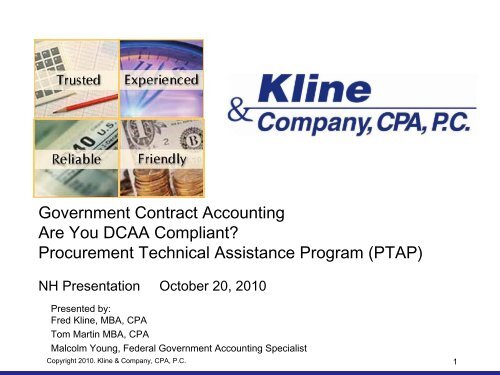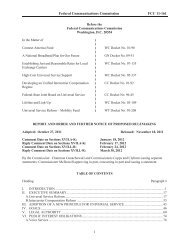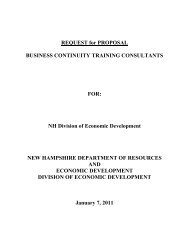Government Contracting Update
Government Contracting Update
Government Contracting Update
You also want an ePaper? Increase the reach of your titles
YUMPU automatically turns print PDFs into web optimized ePapers that Google loves.
<strong>Government</strong> Contract Accounting<br />
Are You DCAA Compliant?<br />
Procurement Technical Assistance Program (PTAP)<br />
NH Presentation October 20, 2010<br />
Presented by:<br />
Fred Kline, MBA, CPA<br />
Tom Martin MBA, CPA<br />
Malcolm Young, Federal <strong>Government</strong> Accounting Specialist<br />
Copyright 2010. Kline & Company, CPA, P.C. 1
Kline & Company, CPA, P.C. Company Overview<br />
• CPA firm providing Business and Individual Tax Planning and<br />
Preparation, Financial Statement Preparation, and Federal<br />
<strong>Government</strong> <strong>Contracting</strong> Services since 1994<br />
• Federal <strong>Government</strong> <strong>Contracting</strong> Services include:<br />
– FAR, CAS, & TINA <strong>Government</strong> Contract Compliance<br />
– Cost/price Proposal Preparation<br />
– Incurred Cost Proposals<br />
– DCAA Audit Representation<br />
– <strong>Government</strong> Accounting System Set-up<br />
– <strong>Government</strong> Contractor Outsourced Accounting<br />
– Compliance Testing<br />
• Team of 11 professionals including 2 former DCAA Auditors<br />
• Located in Downtown Nashua, NH<br />
Copyright 2010. Kline & Company, CPA, P.C.<br />
2
I. DCAA<br />
II. Procurement Regulations<br />
Topics to be Covered<br />
III. Accounting System Requirements<br />
IV. Job Cost<br />
V. Timekeeping<br />
VI. Billing System<br />
VII. What is the <strong>Government</strong>’s Audit objectives?<br />
VIII. Annual ICE Submission (Incurred Cost Electronically) (Sample)<br />
IX. Typical DCAA Engagements<br />
X. The New DCAA<br />
Copyright 2010. Kline & Company, CPA, P.C.<br />
XI. Questions and Answers<br />
3
I. The Defense Contract Audit Agency (DCAA)<br />
• Performs all contract audits for the Department of Defense (DoD)<br />
and other agencies as requested<br />
• Provides accounting and financial advisory services in connection<br />
with the negotiation, administration and settlement of contracts<br />
and subcontracts<br />
• DCAA reimbursed by other agencies<br />
• Previously provided advice (Now opinions only)<br />
Copyright 2010. Kline & Company, CPA, P.C.<br />
4
II. Impact of the Procurement Regulations on<br />
Job Cost Accounting<br />
Copyright 2010. Kline & Company, CPA, P.C.<br />
• The FAR<br />
- FAR is primary reference<br />
- Each agency can develop its own supplement to the FAR (DFARS)<br />
- General contracting requirements are contained in the FAR<br />
- Separate set of regulations for non-profits (OMB’s)<br />
• Key FAR sections<br />
- <strong>Contracting</strong> by Negotiation (FAR Part 15)<br />
- Cost Accounting Standards (FAR Part 30)<br />
- Cost Principles (FAR Part 31) (Handout)<br />
- Contract Management (FAR Part 42)<br />
- Contract Clauses (FAR Part 52)<br />
- Forms (FAR Part 53)<br />
5
III. Accounting System Requirements for<br />
Maintaining Compliance<br />
• Accounting system properly segregates direct and indirect costs<br />
• Identifies and accumulate direct costs by contract<br />
• Logical and consistent method for indirect cost allocation to<br />
intermediate and final cost objectives (contract)<br />
• Cost accumulation under general ledger control<br />
• Timekeeping system that identifies employee’s labor by intermediate<br />
and final cost objectives<br />
• Labor distribution system that charges direct and indirect labor to the<br />
appropriate cost objectives<br />
• Unallowable costs excluded and properly identified at source<br />
• Costs identified by contract line item (CLIN) if contractually required<br />
Copyright 2010. Kline & Company, CPA, P.C.<br />
6
III. Accounting System Requirements for<br />
Maintaining Compliance<br />
• Ability to calculate actual indirect cost rates and support requests for<br />
provisional rate updates and provide support for progress payments<br />
• Actual Labor rates collected from Payroll to provide detailed labor<br />
distribution<br />
• Detailed Job Cost Reporting for direct and indirect costs<br />
• Provides for consistency in bidding, collecting and reporting cost at the<br />
same element level for CAS 401 consistency of the system<br />
• Charge Subcontracts, ODCs & Materials directly to projects or task<br />
orders for actual costing for consistent application of cost in accordance<br />
with internal procedures<br />
• Ability to extract information via report writers for off-line calculations<br />
(What if proposals and affects to the G&A base for multi-year awards)<br />
• CAS 402 Consistancy (Consistently charged) in identification<br />
(no supplier should be charged as an indirect cost if Bid as direct)<br />
Copyright 2010. Kline & Company, CPA, P.C.<br />
7
III. Accounting System Requirements for<br />
Maintaining Compliance<br />
• Indirect Cost Accounts must be properly identified and<br />
mapped to the indirect cost pool<br />
• Typical indirect cost pools include:<br />
– Fringe<br />
– Overhead (both contractor and customer site)<br />
– General and Administrative (G&A)<br />
– Material Handling<br />
– Most common pools for small and mid sized contractors are<br />
overhead and G&A<br />
• Labor distribution must allow for the proper assignment of indirect<br />
labor to the appropriate pool.<br />
Copyright 2010. Kline & Company, CPA, P.C.<br />
8
III. Why are these requirements so important to<br />
you?<br />
• Ensure reliable and accurate billings to the government customer<br />
• Continuous tracking of contract costs and performance<br />
measurement for use by management<br />
• Reliable cost history for estimating future contract costs and<br />
provisional billing rates<br />
• Enhance ability to maintain profitability<br />
• Reduce risk of DCAA audit issues and audit report findings<br />
• Minimize risk of government investigations and payment of<br />
penalties (or worse)<br />
Copyright 2010. Kline & Company, CPA, P.C.<br />
9
IV. Job Cost Identification & Segregation<br />
What DCAA observations will elevate risk to the negotiating parties?<br />
• Mix of contract types and/or gov’t & commercial contracts<br />
* FFP- risk at proposal stage for government; on contractor if underbid<br />
(no ability for government to change when complete except fraud in<br />
negotiation, etc.)<br />
* CPFF- ability to audit after completion (DCAA has less risk when<br />
awarded because of ability to audit costs)<br />
• Hierarchy of cost objectives (see hand out)<br />
• Perpetual & significant contract cost overruns<br />
• Lack of job cost system, or complex manual system requiring extensive<br />
time and effort<br />
• Late accounting postings to GL or project cost ledger<br />
• Late billings or overdue incurred submissions<br />
• System does not identify unallowable costs<br />
• Prior audits disclosed billed or claimed unallowable costs<br />
• Direct costs erroneously identified to wrong project<br />
• System does not clearly distinguish indirect cost centers<br />
Copyright 2010. Kline & Company, CPA, P.C.<br />
10
• Contract<br />
IV. Hierarchy of Cost Objectives<br />
* Direct Material<br />
* Direct Labor<br />
* Subcontracts<br />
* Other directly related charges<br />
• Manufacturing on Engineering Overhead Pool of Expenses<br />
* Allocated occupancy expenses<br />
* Allocated fringe expenses<br />
* Resulting overhead rates (labor base)<br />
• Material handling expenses<br />
* Allocated occupancy expenses<br />
* Resulting M/H rates (Direct material base)<br />
• General & Administrative Pool of Expenses<br />
* Allocated occupancy expenses<br />
* Resulting G&A rate (cost material base)<br />
• Unallowable costs<br />
Copyright 2010. Kline & Company, CPA, P.C.<br />
11
IV. Job Cost Identification & Segregation<br />
Questions to ponder:<br />
• Is your chart of accounts extensive enough for you to readily identify<br />
types of costs as they are incurred?<br />
• Can you determine cost status of your projects month to month?<br />
• Are you accumulating your costs consistent with contract requirements?<br />
• Is your source accounting data traceable to the project ledger?<br />
• Are indirect costs identified to the correct cost center as they are<br />
incurred?<br />
• Are any of your unallowable costs “hidden” within generic accounts?<br />
• Are you concerned about whether you are billing proper costs to the<br />
government?<br />
Copyright 2010. Kline & Company, CPA, P.C.<br />
12
V. Timekeeping System<br />
• Deficiencies and irregularities in timekeeping systems<br />
have led to more criminal investigations of government<br />
contractors than any other type of anomaly found in an<br />
accounting system<br />
• Anytime DCAA notes significant timekeeping deficiencies<br />
during an audit, the audit scope will be expanded and<br />
possible referrals of suspected irregular conduct to<br />
government investigative agencies are likely especially if<br />
those deficiencies have gone undetected for a long period<br />
Copyright 2010. Kline & Company, CPA, P.C.<br />
13
V. Timekeeping System<br />
What DCAA observations will elevate audit risk?<br />
• Mix of government & commercial contracts<br />
• Mix of government FFP and cost plus contracts<br />
• Lack of written or inadequate timekeeping procedures<br />
• Significant adjusting entries to G/L labor charges<br />
• Movement of labor charges from one project to another<br />
• Data indicated on timesheet during floor check does not match<br />
time sheet after entered to labor distribution<br />
• Significant and non-verifiable changes and alterations to<br />
employee timesheets<br />
• Timesheets without employee signature<br />
• Inadequate demonstration of employee training for preparing<br />
time sheets<br />
• Floor check discloses that employee charging one job (gov’t)<br />
while working on another (commercial)<br />
• Significant increases in indirect labor charges vs. direct charges<br />
Copyright 2010. Kline & Company, CPA, P.C.<br />
14
V. Timekeeping System<br />
Questions to ponder:<br />
• Do all employees know timesheet preparation procedures?<br />
• Are all employees aware of repercussions associated with falsification of<br />
labor charges?<br />
• Do you have written timekeeping procedures that are up to date?<br />
• Do you have a varied mix of contract types?<br />
• Does your electronic timekeeping system allow for online time entry,<br />
approvals and corrections?<br />
• Are all time sheets carefully reviewed when submitted?<br />
• Do your employees know how to correctly identify projects & tasks on<br />
their timesheets?<br />
Copyright 2010. Kline & Company, CPA, P.C.<br />
15
VI. Billing System<br />
• Perhaps the most important financial system you will want to get<br />
right is your company’s “billing” system<br />
• An adequate billing system should include direct costs from job<br />
cost ledgers with the use of approved provisional indirect billing<br />
rates<br />
• An inadequate billing system will significantly raise the risk of<br />
overcharging the government during progress billings<br />
• Overcharging the government during contract performance, or the<br />
impression of over charging the government will guarantee<br />
increased audit oversight and/or civil or criminal investigations<br />
Copyright 2010. Kline & Company, CPA, P.C.<br />
16
VI. Billing System<br />
Fundamental requirements:<br />
• Segregate and exclude unallowable costs per FAR (Part 31) cost<br />
principles or contract terms ( see FAR (Part 31) handout)<br />
• Identify costs in appropriate detail as specified by contract (WBS, CLIN,<br />
etc.)<br />
• Identify costs requiring specific approval of CO (overtime premium,<br />
capital equipment purchases, etc.)<br />
• Exclude costs not billable per specified terms of progress payment or<br />
public voucher<br />
• Withhold costs in excess of current ceilings or not permitted until<br />
completion (progress payment liquidations or fixed-fee withholdings)<br />
• Identify final indirect rates and make timely adjustments to retroactive<br />
billings (cost type contracts)<br />
• Monitor compliance with Limitation of Cost contract clauses<br />
Copyright 2010. Kline & Company, CPA, P.C.<br />
17
VI. Billing System<br />
What DCAA observations will elevate audit risk?:<br />
• Materiality of contract price/monthly billings<br />
• History of inadequately prepared billings to government<br />
• Losses on FFP contracts<br />
• Billed/incurred costs that do not reconcile to accounting records<br />
• Inadequate accounting/timekeeping system<br />
• Inadequate expression of ETC for progress payment calculations<br />
• Obvious inclusion of unallowable costs<br />
• Cumulative billings exceed existing contract price/CP ceilings<br />
• Incurred cost proposals are significantly late<br />
• Poor system of contract/subcontract administration<br />
Copyright 2010. Kline & Company, CPA, P.C.<br />
18
VI. Billing System<br />
Questions to Ponder:<br />
• Does my accounting system accurately identify project costs on an<br />
interim basis?<br />
• Are my contract administration records up to date?<br />
• Are cumulative billed costs frequently reconciled with project cost<br />
records?<br />
• Do T&M fixed labor rates match the contract provisions?<br />
• Do my provisional indirect rates represent my best estimate for the<br />
complete fiscal year?<br />
• Are funding limitations or contract restrictions being adhered to?<br />
• Are fee retentions/withholdings properly stated?<br />
Copyright 2010. Kline & Company, CPA, P.C.<br />
19
VII. <strong>Government</strong>’s Audit Objectives<br />
Why are these requirements so important to<br />
you?<br />
• Without an adequate system, the likelihood of being awarded a contract is<br />
minimal<br />
• Allows reliable and accurate costs to be billed to the government customer<br />
• Continuous tracking of contract costs and performance measurement<br />
• Reliable cost history for estimating future contract costs/provisional rates<br />
• Enhanced ability to ensure profitability on future contracts through<br />
budgeting<br />
• Reduce risk of DCAA audit issues and audit report findings<br />
• Minimize risk of government investigations and payment of penalties, (or<br />
worse)<br />
• TINA applicability<br />
Copyright 2010. Kline & Company, CPA, P.C.<br />
20
VIII. ICE – Sample ICE Submission<br />
IX. Typical DCAA Engagements<br />
• Pre award review<br />
• Accounting system review<br />
• Proposal reviews<br />
• Incurred cost audits<br />
• Forward pricing reviews<br />
• Labor system floor checks<br />
• Material system review<br />
• Provisional billing rate change requests<br />
• Exit conferences<br />
Copyright 2010. Kline & Company, CPA, P.C.<br />
21
X. The New DCAA<br />
• DCAA will no longer report inadequate in part options and will find<br />
systems either wholly adequate or inadequate<br />
• New policies forbid auditors to make suggestions for improvement<br />
in contractor’s systems<br />
• As part of the audit process, DCAA has teams of professional personnel solely<br />
representing the United States <strong>Government</strong> to ensure compliance with <strong>Government</strong><br />
Procurement Regulations. As a <strong>Government</strong> Contractor, you are entitled to similar<br />
professional representation to ensure a level playing field during negations and<br />
performance. The costs related to this assistance are fully recoverable as part of your<br />
company’s indirect rate structure<br />
Copyright 2010. Kline & Company, CPA, P.C.<br />
22
Contact Information<br />
Fred Kline, MBA, CPA Tom Martin, MBA, CPA<br />
(603) 881-8185 (office) (603) 881-8185 (office)<br />
(603) 883-6887 (fax) (603) 883-6887 (fax)<br />
fkline@klineco.com tmartin@klineco.com<br />
www.klineco.com www.klineco.com<br />
Malcolm Young<br />
Federal <strong>Government</strong><br />
Accounting Specialist<br />
(603) 881-8185 (Office)<br />
(603) 883-6887 (fax)<br />
myoung@klineco.com<br />
www.klineco.com<br />
Copyright 2010. Kline & Company, CPA, P.C.<br />
23







